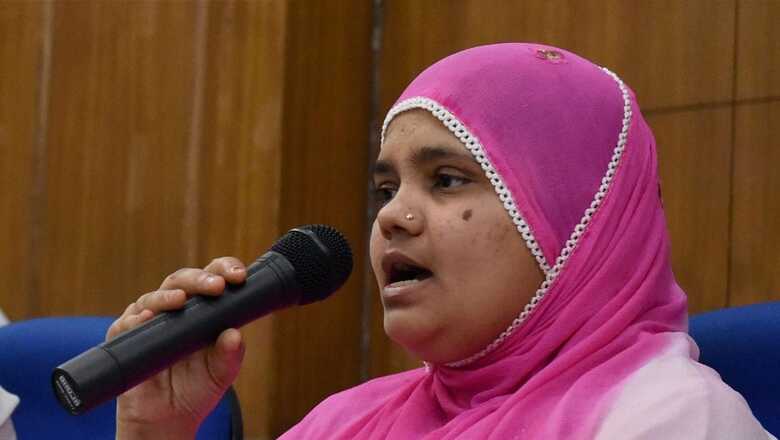
views
The Supreme Court on Monday quashed the decision of the Gujarat government to grant remission to 11 convicts in the case of gangrape of Bilkis Bano and murder of her family members during the 2002 Gujarat riots.
The apex court held that the state, where an offender is tried and sentenced, is competent to decide the remission plea of convicts and added that Maharashtra was the competent government to grant remission in this case.
Earlier in October, a bench of Justices B V Nagarathna and Ujjal Bhuyan had reserved its verdict after an 11-day hearing on the petitions, including the one filed by Bano.
Bilkis Bano had moved the Supreme Court challenging the release of 11 convicts who had gang-raped her and killed seven members of her family during the 2002 Godhra riots in Gujarat.
What Does the Petition Say?
The Gujarat government on August 15, 2022 released 11 men convicted of Bilkis’ gang rape and the killing of her family, causing an outrage. The government cited good behaviour as the reason behind the release of 11 convicts.
The government said it “decided to release 11 prisoners since they have completed 14 years and above in prisons and their behaviour was found to be good". It further justified its decision on the grounds that the remission was granted in accordance with the 1992 policy which placed no bar against the premature release of rape convicts.
The Gujarat government told the Supreme Court that the release of the men was approved by the Union home ministry within two weeks.
Following the release, the victim Bilkis Bano filed a petition in the Supreme Court contesting the remission granted to them. Several other PILs, including one by CPI(M) leader Subhashini Ali, independent journalist Revati Laul and former vice-chancellor of Lucknow University Roop Rekha Verma, also challenged the relief. TMC leader Mahua Moitra has also filed a PIL against the remission and their premature release.
What is the Bilkis Bano case?
In February 2002, there were riots in Gujarat after the Sabarmati train carrying ‘karsevaks’ was burnt in Godhra, in which fifty-nine ‘karsevaks’ were killed in the train.
Fearing violence, then five-months pregnant Bilkis Bano fled from her village Randhikpur with her three-year-old daughter and 15 other family members. They sought refuge in the Chhaparvad district.
However, on 3 March 2002, a group of around 20-30 people armed with swords and sticks attacked Bilkis and her family. Among the attackers were the 11 men accused of raping her. Bilkis, along with her mother and three other women were raped and assaulted while her three-year-old daughter was killed by the mob.
Of the 17-member group of Muslims from Radhikpur village, eight were found dead, six were missing. Only Bilkis, a man, and a three-year-old survived the attack, according to a report in The Indian Express.
After Bilkis regained consciousness, she borrowed clothes from an Adivasi woman and registered a complaint at the Limkheda police station. She was then taken to a public hospital for examination only after she reached the Godhra relief camp.
The Trial So Far
After the incident, the local police repeatedly rejected Bilkis Bano’s case, citing insufficient evidence. Her case went to the National Human Rights Commission (NHRC) and Supreme Court, which in 2003, ordered the Central Bureau of Investigation (CBI) to undertake an inquiry in the case. The accused in the case were arrested in 2004 and the trial began in Ahmedabad.
Bilkis expressed her worries that witnesses could be harmed and the evidence collected by the CBI tampered with, after which the apex court then transferred the case from Ahmedabad to Bombay.
In January 2008, the Special CBI Court sentenced 11 accused to life imprisonment on the charges of conspiring to rape a pregnant woman, murder and unlawful assembly.
The eleven accused included Radheshyam Shah, Jaswant Chaturbhai Nai, Keshubhai Vadaniya, Bakabhai Vadaniya, Rajibhai Soni, Rameshbhai Chauhan, Shaileshbhai Bhatt, Bipin Chandra Joshi, Govindbhai Nai, Mitesh Bhatt, and Pradip Modhiya.
The court acquitted seven other accused for lack of evidence. One of the accused had died during the trial. The court held that Jaswantbhai Nai, Govindbhai Nai, and Naresh Kumar Mordhiya (deceased) had raped Bilkis, while Shailesh Bhatt had killed her daughter, Saleha, by “smashing" her on the ground.
The Bilkis Bano gangrape case has been one of the prominent topics since the Gujarat riots and stood out as one of the most talked about verdicts in recent history.
The Bombay High Court in May 2017 upheld the conviction and life imprisonment of 11 convicts in the rape case.
Why were the convicts released?
Radheshyam Shah, one of the convicts, filed a petition in the Gujarat High Court seeking remission of the sentence under provisions outlined in sections 432 and 433 of the Code of Criminal Procedure. The high court rejected the plea while observing that the “appropriate government" to take a decision about his remission is Maharashtra and not Gujarat.
Shah filed a plea in the Supreme Court, pleading that he had been in jail for 15 years and four months without remission as of 1 April 2022. The apex court directed the Gujarat government to look into the issue of remission of his sentence following which the government formed a committee.
The committee took a unanimous decision in favour of remission of all the 11 convicts in the case last year after which they walked out of Godhra sub-jail on August 15, 2022.

















Comments
0 comment